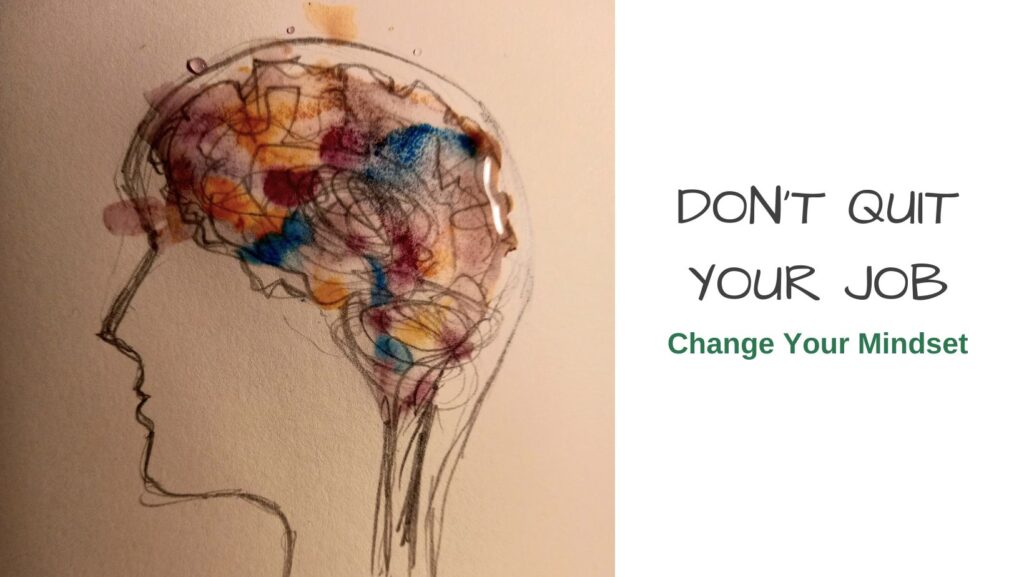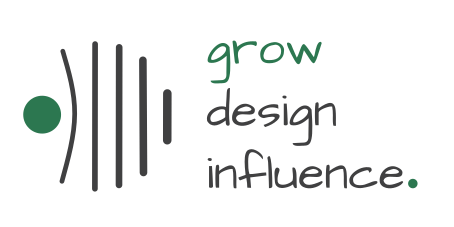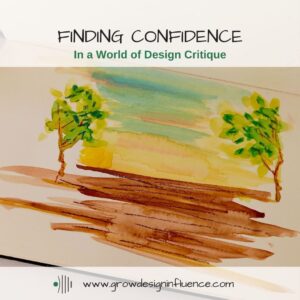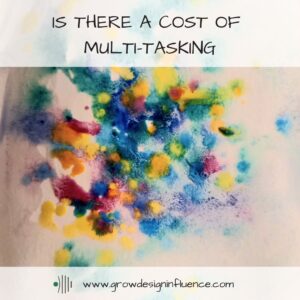Disclaimer: This post contains affiliate links. If you choose to purchase something after clicking a link, I may receive a commission at no extra cost to you (learn more). Thanks for your support.

you cannot quit your mind; it follows you wherever you go.
Changing my mindset taught me that taking control and thinking about things differently changes the situation. When you don’t do this work, you will carry your mindset with you and face the same issues and challenges at your next job. Don’t quit your job before you first try working on yourself.
Why You Might Feel like Quitting and What to Do Instead
Perhaps you feel like you are not valued or like you cannot make a meaningful impact. Perhaps you feel misunderstood or poorly treated and therefore lack motivation and inspiration.
These are all feelings I have experienced so I know how hard it can be. After heaps of personal growth and self-development, I am so happy that I did not throw my career aside for something else through wrong beliefs about my worth in the role. I admit it took going to rock bottom and changing jobs once to really want to make a change in myself. But I didn’t know then, what the causes of my feelings were. I hope I can help you to understand this earlier and avoid rock bottom!
Understand Stress
Stress at work can be defined as an interaction between a particular situation and an individual. When the individual does not have the resources to cope with the pressure of a situation then they react both psychologically and physically.1
The degree of stress that a person experiences can be attributed to two aspects. The first is an alarm reaction which is typically responded to by our flight or fight response. This is great for facing physical danger such as a dangerous animal but when the stress is psychological then learning assertive communication is a better mechanism.2
Adaptation is the second aspect involved in people’s ability to manage stress. This is our ability to recognise certain things as not being stressful through past experience.3
For example, if you saw a plane flying over your head for the very first time without previous experience of what it was, then it could be alarming. Once we learn what something will do and what danger potential it has, we adapt our perceptions. I have found learning adaptation to be extremely useful. To assist with adaptation I ask myself questions like:
- Has somebody been hurt or is there risk of that?
- What would happen if I did not meet my deadline?
- What action could I take to mitigate the stressor? Is it something that can be changed?
Our Education System
Our schooling system focuses on and rewards rote learning and the ability to pass exams. We learn very few life skills that will set us up to thrive in the workforce and develop meaningful and lasting relationships. I have included a list of some important life skills4 below so that you understand what I am referring to:
- Communication
- Critical thinking
- Creative thinking
- Self-awareness
- Empathy
- Assertiveness
- Resilience
- Decision making
- Problem solving
- Learning
When you do start working and it’s hard, you need to understand it’s not your lack of skill but a knowledge gap. The good news is, knowledge gaps are easy to fill, it just takes willingness, time and commitment.
In the short term, don’t quit your job, instead, focus on managing stress and filling those knowledge gaps. Check out my Grow Page for more articles on self-development. I have also compiled some of my favourite resources in one easy to access location.
Tools for Managing Stress
Become the master of your health. Take control of your mental well-being through meditation and personal growth. Seek help from a mental health professional if you need it. Take control of your physical health by getting enough sleep, eating the right things and exercising.
Exercising regularly is linked to reduced stress sensitivity.5 Neglecting your circadian rhythm and sleep deprivation are linked to less resilience to stressors as well as a lower cognitive function.6 Stress is linked to unhealthy diets as people crave comfort foods however, during times of stress the body actually has an increased need for certain vitamins so this is a time when extra dietary care is required.7
For me, the benefits of health were easy to learn but it took me ages to apply. Once I started to feel how good health feels, my motivation remained and I started to live a healthy life. I also aligned health to my purpose or vision which gave me motivation beyond ‘being fit’. I was able to see that being fit improved my cognitive function and therefore helped me to achieve what I wanted to achieve. Do your own research as to the benefits of healthy living but two things made a huge difference to me; cutting out sugar from my diet and starting to exercise regularly. It has made me feel like a completely different person with increased energy, clarity of mind, confidence, vitality and less sickness.
I love the FitOn app. It provides fairly short length workouts you can do from home which are easy to fit into your week.
Another factor to consider for stress management is making sure you are doing some things that give you joy. Undertaking leisure activities is known to at least buffer the effects of stress. There is an additional benefit if undertaking leisure with friends as you then get the benefits of social support.8
In my experience, I find it useful to have a list of the things in life that I love. Write them down now by answering the following questions.
- What could you do for hours at a time?
- What activities get you into a place of flow where you don’t think about the things around you.
- When did you last feel intense joy?
- What distracts you from things you don’t want to do?
My joy activities are painting, getting into the wilderness and playing music. Make sure you make time for your joy activities. I made the mistake of largely sacrificing these things because I thought that if only I worked harder, then things would be different. But they weren’t, I just felt more exhausted and wasn’t getting results.
Know Your Values – Are You Misaligned?
I think knowing your values helps with your self-awareness (one of the life skills listed above). Self-awareness is important because it helps you make decisions and it leads to acceptance of yourself. Understanding my values is one of the first things I did at the beginning of my road to change and it helped enormously.
Values work in relation to stress is part of a psychology tool called Acceptance and Commitment Theory.9 I am not a psychologist and therefore if you feel like you need help in this area please consult an expert.
The process of identifying values is also applied in many contexts outside of clinical psychology. For example, many businesses now go through the exercise of defining their core values. It is a way to define who they are and steer the direction of the company, as well as give a signal to how they relate to those around them, including staff and clients.
My process was first to sort through many values and then to write down my top five. I’m offering you a free printable by signing up for my newsletter. It provides you with cutouts of 72 possible values which you can then re-order to help you come up with your top five.
For some additional help from experts, check out the WHO guide Doing What Matters in Times of Stress: An Illustrated Guide.
I found that once I knew what my values were, then I could better make decisions that would take me in the direction I wanted to go. For example, I started putting my hand up to work on projects that had a water or wetland component because that aligned with my value of nature.
I found that much of my stress had been caused by doing tasks that were misaligned with my core values. Working like that was exhausting. Once you know what your values are, you can start building the values into the work you are doing.
For more on a similar theme, check out Simon Sinek’s Ted Talk:
He talks about starting with why and knowing the reasons you do the things you do. This is intrinsically linked to your values which are a piece of who you are and shape why you do things.
If you liked this you might also like his books:
Don’t quit your job before doing this work. How would you know where to get the job next if you don’t get to know your values and why you do the things you do? Through doing this work you might find the job you are currently doing is perfect, you just needed to do some personal growth or you might find that you are completely misaligned and need to look elsewhere. If this is the case, then you will be primed to choose the right workplace. Use some time to really understand the reason for such a big and life-changing decision.
How to Shift Your Mindset
You don’t know what you don’t know so get learning. Read and listen to podcasts and expose yourself to the viewpoints and mindset of those in the positions you want to be in.
Do your own research to figure out what reading is best for you. There are two types of books that I have found useful. Either books which are backed by science or books by people in a position I want to be in. I have found value in understanding the thought processes of successful people. To me this, as well as science, provides value but you do need to be aware that every person is different and what works for one person may not work for another. The key is to take on board the learnings and then do some critical thinking about what resonates with you and works for you and what doesn’t.
Three books that helped me:
Peter Voogd is an entrepreneur and his content primarily targets millennial entrepreneurs however so much of what he talks about can be applied to every life circumstance. He has been featured on podcasts as well as hosting his own one (YEL 2.0). Check them out if you want to know if he will resonate with you. Just type his name into the search engine wherever you get your podcasts.
My Two Favourite Podcasts:
Dream Big My Friend – Francis Vidokovik
Short format life hacks to help you realise that you are in control of your mind.
The Daily Mastery – Robin Sharma
Great short format podcast about mastering all aspects of life. Robin Sharma normalises feelings and provides valuable content to help shift the way we perceive and go through life.
Don’t quit your job yet! If you are feeling stuck then there is a likelihood that you will take your challenges with you to the next job. I suggest doing some personal growth, understanding who you are and then making a reasoned decision from a place of clarity.
Book Your Free 30-minute Consultation
- Michie, S. (2002).Causes and Management of Stress at Work. Occupational and Environmental Medicine, 59(1), 67–72.
- Michie, S. (2002). Causes and Management of Stress at Work. Occupational and Environmental Medicine, 59(1), 67–72.
- Michie, S. (2002). Causes and Management of Stress at Work. Occupational and Environmental Medicine, 59(1), 67–72.
- Life Skills. (2022, March 22). In Wikipedia.
- Salmon, P. (2001). Effects of physical exercise on anxiety, depression, and sensitivity to stress: A unifying theory. Clinical Psychology Review, 21(1), 33–61.
- McEwen, B. S., & Karatsoreos, I. N. (2015). Sleep Deprivation and Circadian Disruption. Sleep Medicine Clinics, 10(1), 1–10.
- Gonzalez, M. J., & Miranda-Massari, J. R. (2014). Diet and Stress. Psychiatric Clinics of North America, 37(4), 579–589.
- Caldwell, L. (2005). Leisure and health: Why is leisure therapeutic? British Journal of Guidance & Counselling - BRIT J GUID COUNS, 33, 7–26.
- Ruiz, F. J. (2010). A Review of Acceptance and Commitment Therapy (ACT) Empirical Evidence: Correlational, Experimental Psychopathology, Component and Outcome Studies. International Journal of Psychology, 39.











Pingback: Goals for Happiness and Success in 3 Steps -
Pingback: Choosing a Simple Life in a Modern World; Surprising Benefits at Work -